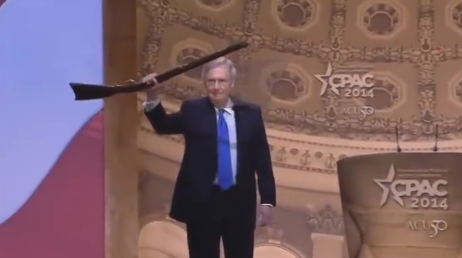On Thursday, the New York Times teased The Upshot, a new site “demystifying politics, economics and other subjects” that will replace the “disruptive” Nate Silver, with an essay throwing cold water on the idea that there will be an exciting U.S. Senate race in Kentucky this fall.
Upshot contributor Nate Cohn dismisses polls showing Minority Leader Mitch McConnell in a “dead heat” with Democrat Alison Lundergan Grimes. He writes, “a McConnell defeat would be all but unprecedented,” given the partisan leanings of the state and its antipathy toward Democratic president Barack Obama.
Cohn doesn’t throw in as much data as Silver typically does, instead emphasizing history. He notes, for example, that the last person to knock off an incumbent senator in a midterm election in a state that voted against the president was North Carolina’s John Edwards in 1998. (Grimes can hardly point to him as a model for victory.) A little more history and a little less number-crunching isn’t a bad model for The Upshot. Cohn, in particular, has always been good at looking back without romanticizing the past (unlike, say, David Gergen).
Still, the historical approach is similar to the Silver approach in that it cautions readers against buying into a lot of dramatic narratives — a wave that ousts incumbents from both parties, an independent candidate capturing the great middle ground of politics — that both beat reporters and newspaper columnists like to promote. Just as Nate Silver did, The Upshot is likely to tick off other Times journalists who depict campaigns as wildly unpredictable, with “gaffes” having a big impact on results.
I can sympathize with Cohn and company here. If you study election results as intently as I have, you inevitably reach the conclusion that changes in American politics are slow and incremental, and they’re driven by demographics more than by campaign strategies. The trick for The Upshot is get readers interested in Big History, and not just Moneyball-type data.
Spring forward, fall back, turn out
Even if this fall’s midterms are boring, it could be easier to turn out voters with Daylight Savings Time ending on November 2, two days before the election. Pacific Standard’s Tom Jacobs explains why:
Iowa State University political scientist Robert Urbatsch reports voter turnout goes up in years when the November election occurs just two days after the end of daylight saving time. Urbatsch found this extra-hour-of-sleep effect using three different measures — results that suggest well-rested voters are more likely to make it to the polling station. The debates in Congress about extending DST focused not on elections, but rather on “trick-or-treating at Halloween,” he notes. “Yet precisely because the change did not explicitly aim to manipulate voting, it sheds a unique light on the public’s decision-making process surrounding voting.”
Image of Sen. Mitch McConnell at CPAC convention from his campaign website.








